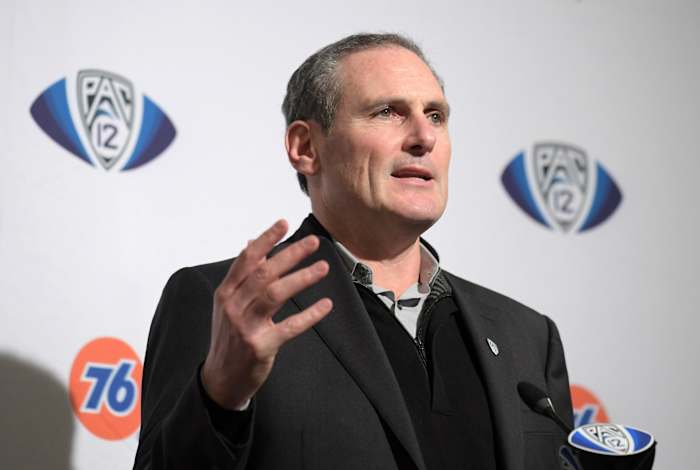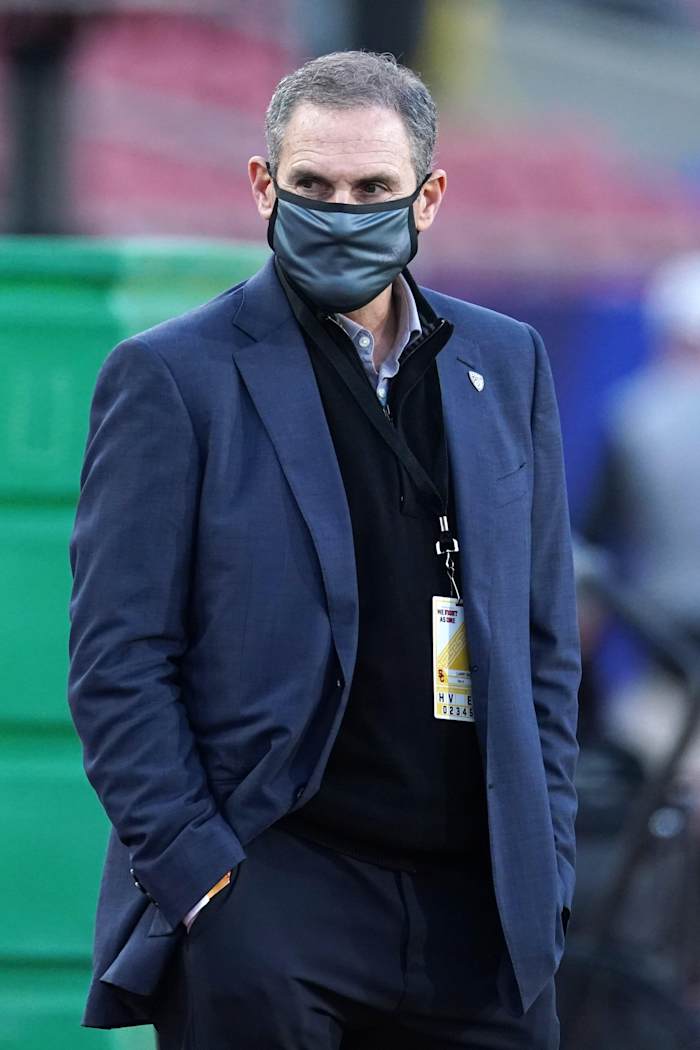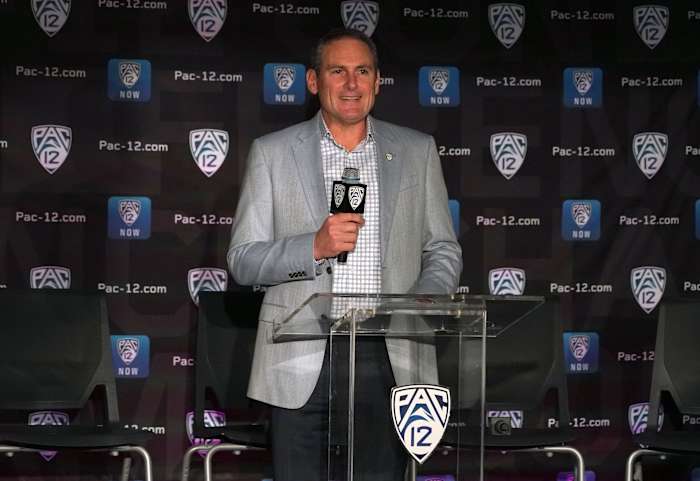Pac-12 Conference And Commissioner Larry Scott Agree To Part Ways
Beginning in July 2021, the Pac-12 conference will be under new leadership.
In a meeting featuring the conference's governing executive committee, its presidents and Commissioner Larry Scott, the Pac-12 announced on Wednesday that both sides have agreed to mutually part ways after what can best be described as an up-and-down tenure during Scott's 11-year reign.
“We appreciate Larry’s pioneering efforts in growing the conference by adding new competitive university programs and accelerating the Pac-12 to television network parity with the other conferences,” said University of Oregon President Michael Schill, chair of the Pac-12 executive committee. “At one point, our television agreement was the most lucrative in the nation and the debut of the Pac-12 Network helped deliver our championship brand to US and global markets on traditional and digital platforms. That said, the intercollegiate athletics marketplace doesn’t remain static and now is a good time to bring in a new leader who will help us develop our go-forward strategy.”

Dec 6, 2019; Santa Clara, CA, USA; Pac-12 commissioner Larry Scott speaks at a press conference during the Pac-12 Conference championship game between the Oregon Ducks and the Utah Utes at Levi's Stadium. Mandatory Credit: Kirby Lee-USA TODAY Sports
Scott's contract was set to expire in June 2022, but it has been determined that he will remain in his current role until June 30, 2021 to help a smooth transition of power. The primary reason for having Scott not finish out his current contract is so that the new commissioner will "be in place to negotiate and maximize the Conference’s next important long-term media rights agreement."
Led by the Pac-12 executive committee, the search for a new commissioner will begin immediately. The committee includes Schill; Kirk H. Schulz, Washington State University president; and Ana Mari Cauce, president of the University of Washington.
According to Scott, the time is right for him to step down and let someone else take the lead. It's been a long while coming as there have ben a lot of discontent with Scott featuring the Pac-12s current TV deal, as well as his handling of the COVID-19 pandemic and the start times/fan attendance issues that the rest of the nation has apparently conquered.
“I was in pro sports for 20 years, I’ve now been in college athletics for more than 10 years, and now is a great time in my life to pursue other exciting opportunities," Scott said in a statement. "This moment, when college athletics are moving in a new direction and with the Conference soon commencing the next round of media negotiations, it seems the right time to make a change. It is important that the conference be able to put in place the person who will negotiate and carry out that next agreement. Based on the recent robust valuation and marketplace interest we’ve received from traditional and nontraditional media organizations, I am confident the conference is well-positioned for continued success. I appreciate the support of the Pac-12 member institutions and a very talented staff, with whom it has been my privilege to work.”
Scott spoke with Sports Illustrated about his tenure as Pac-12 commissioner, remembering some of the highs and lows of the conference, as well as what he's most proud of and what he could've done better. Read below...
Sports Illustrated: How did this go down?
Larry Scott: Had a sitdown with my board members, the executive committee, the three presidents, we had a scheduled sitdown to start talking about the future, which is our normal process. The idea was to do it 18 months out (of the contract expiring). If we’re not going to continue for whatever reason, everybody has a year to figure it out.What became clear from the first conversation is the conference leadership wants to head in a new direction. I was able to express to the group that it’s a good time in my life to make a change having done it… 20 years in pro sports and 10 here. And seeing the different direction college sports is going in and where our league is heading at the moment… I thought a fresh start for them would be good.I really enjoy the transformation and the growing and the re-imagining, which was the hallmark of my first five or six years here. That was what was needed at the time. That’s what I enjoyed most and had a real passion for. I’m ready for the next situation and opportunity where that would play to my skills, passion and interests to transform and grow. That’s not really where we’re at at the moment. That became clear in the first conversation we had.Rather than go 18 months, if that’s where we’re at, there’s no reason to wait. I’m eager. Once you make that decision in your mind, you’re ready to move on. They asked me if I’d stay to the end of this year and I said yes, to give them the chance… they’ve got to now regroup and try to find my successor.

Dec 18, 2020; Los Angeles, California, USA; Pac-12 commissioner Larry Scott watches during the Pac-12 Championship between the Oregon Ducks and the Southern California Trojans at United Airlines Field at Los Angeles Memorial Coliseum. Mandatory Credit: Kirby Lee-USA TODAY Sports
SI: What’s next for you?
LS: I don’t have a specific thing I’m moving to. I’ll stay focused on this. There are plenty of challenges we’ve been dealing with over the last year and I want to make sure I can provide steady leadership through choppy waters over the next few months and then I’m going to take a step back with my wife.Some of this was a very personal decision as well. It comes at a time in my life where my wife and I’s youngest child is going off to college. We’ll be empty nesters. It’s an exciting time in my life as well. I’m going to take some time and really think about what I want to do next. A lot of opportunity out in the world right now.
SI: Until you leave the job, what are the big goals for you?
LS: COVID first and then it’s a very disruptive time for our league and college athletics. It’s very intense. Just managing through our sports seasons. Secondly, we’re trying to chart a course around very important long-term strategic issues—NIL, Alston (Supreme Court case), revising a compact with our student athletes. That’s the next few months for sure. I’d say those are the two biggest issues, helping get us through the current situation and some of the major strategic issues facing college sports.
SI: When you look back on your tenure, what do you believe are your greatest accomplishments?
LS: Well, I guess I’d prefer other people to comment on it. My mission when I was hired was to transform and modernize the league. There are a lot of different ways in which we did that, starting with expanding the conference, moving to equal revenue sharing, starting the football championship game, bringing our basketball tournament to Las Vegas, starting the Pac-12 Network and setting us up for great success when the conference goes to market (for a new TV deal). First league to do stuff in China and in Asia.I’d say that on the one hand, but on the other hand, our universities really deeply believe in the mission of supporting student athletes. I don’t think there’s a league that’s done more in supporting student athletes, in terms of expanding healthcare coverage, easing internal transfer rules, the research initiatives we started around mental health, concussions and other issues.I think we’ve done more to engage and enhance support for student athletes than any other conference. I was a student athlete myself. That was the core mission.

Oct 8, 2019; San Francisco, CA, USA; Pac-12 commissioner Larry Scott speaks during Pac-12 media day at the Pac-12 Network Studios. Mandatory Credit: Kirby Lee-USA TODAY Sports
SI: What about regrets?
LS: Over an 11-year period, with all the issues you deal with, there are a lot of things I could have done better along the way.What we did with our television agreements was with a very much long-term view in mind—which I think will pay off handsomely for the league in 2023—but I realize there are tremendous short-term pressures for our schools. If there is one thing, I would have done shorter media agreements so that we would have been able to leapfrog sooner.If there’s one thing I could wave a magic wand over, it’s that. There’s been a lot of turnover. There’s been a lot of short-term pressures on our schools.
SI: People criticize the length of the TV deal quite a bit. Does that eat at you?
LS: No, not really, because there was complete alignment with the presidents and chancellors and ADs who were involved then. Everyone was aligned in what we were doing. It’s hard to go back with the benefit of hindsight when everyone is aligned in what you’re doing.
SI: During the wave of conference expansion, the Pac-12 was aggressive, even pursuing Texas and Oklahoma for a 16-team super conference. What if that would have happened? Do you think about that?
LS: I believe it would have worked out exceedingly well and it was very close to happening. I think that whole exercise opened people’s minds to what the Pac-12 could be. At that stage it was the Pac-10. Kind of surprised people by the boldness of our ambition in taking a big swing. It set an intention. When I was hired, it was with a goal of ‘Let’s take some risks and swings! Let’s be more aggressive and modernize the conference!’Some things worked out exceedingly well and some things not as well and that comes with being prepared and taking some chances and being bold. That whole expansion process opened peoples’ minds. And we’ve been absolutely delighted with Colorado and Utah. It’s been a great fit. But it’s hard to know how the 16 would have worked. It wasn’t meant to be.
SI: Should we expand the playoff?
LS: I think I’ve been public in saying this year we should have played eight. I thought it was a no-risk move. This was a year that there was no non-conference play. If ever there was a year, it would have been this year. The support wasn’t there. I think that suggests it’s probably going to be a while. If people weren’t prepared to do it this year, when it would have been easier to do, it’s obviously not easy to do in that room.
Making a profile is free and it only takes ~1 minute to set up. Also, be sure to like us on social media for future coverage:
Twitter — @UtahUtes_SI and Ryan Kostecka at @Ryan_Kostecka